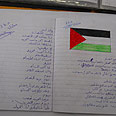

&91;1&93;.jpg)
"We identified with the Palestinians in Gaza," the young Bedouins from Shfaram explained after their arrest on terror charges. The case, cleared for publication on Sunday at Ynet's request, is the most recent in a series of terror-related incidents and arrests involving youths from Israel's Bedouin sect.
Some experts see the developing phenomenon as proof that the Bedouins are moving to embrace the Palestinian narrative.
"There are problems within the Bedouin community – a lot of social and scholastic gaps, state negligence
that has led to all sorts of madness amongst children and teenagers," explains Professor Ismail Abu-Saad, a lecturer at Ben Gurion University who has extensively researched education policy in regards to the Bedouin residents of southern Israel.
"Bedouin youths lack so much, the state barely invests in the Arab public. Unemployment is high, as are drop-out rates," Abu-Saad says, adding that youths were acting out as a result of being affected by these problems.
He says he finds it hard to believe that the group from Shfaram is involved in terrorism. "There's a tendency to interpret everything as a security matter, but I reject this theory. It's very easy to always blame the people from the sidelines, the weak and those left behind," Abu-Saad says.
'Easy prey for terror groups'
Yoni Figel, a senior researcher at the Interdisciplinary Center in Herzliya whose work focuses on anti-terrorism policy, has a different view of the potential unfolding danger. "There's a worrying increase in the willingness of Bedouins to be involved in terror. If before they mainly aided and abetted, like transporting a suicide bomber or wired car, the recent events point to Bedouins willing to be directly involved in terrorism," Figel says.
"The Bedouins have it worse than any other sect. They acutely feel the improper treatment they get from the State of Israel. They have difficult feelings of discrimination, negligence and lack of attention, and these lead to an increase in their frustration, rage, and despair. The state has made, and continues to make, historical errors in regards to the Bedouins in that (the state) did not know how to nurture this sect as part of Israeli society.
"Given that, and given the effect of the Palestinian ethos on the one hand and Islamization on the other, you see an erosion of the Bedouin's willingness to be part of the State of Israel. This is fertile ground for radical Islam – Israel's Arabs are easy prey in the hands of the terror organizations."
The Al-Jazeera effect
Arabic studies lecturer, Dr. Mordechai Kedar, disagrees with the claim that the Bedouin's identification with the Palestinians stems directly from the state's failure to develop their communities and integrate them into Israeli society.
"The issue is that they are on the sidelines of the Arab sect as well, and are seeking to pave their way into the Arab public in Israel through their identification with the Palestinian ethos," he says.
According to Dr. Kedar, "the Bedouins did not want to belong to the state, and the state did not want them to belong either. They serve in the IDF because they need a livelihood, they don’t share the Zionist ethos. And in the midst of this, some of the youths develop a Palestinian ethos, especially the ones in the North, because of their proximity to the fields. They no longer want to be nomadic, and they connect to those living in cities and towns. Part of their urbanization process if adopting the Palestinian ethos of those living with Israeli citizenship."
Kedar says the media has played a large role in their anger over the IDF's operation in the Gaza Strip.
"The Bedouins are taking their frustration out by connecting to something more radical, and this is a result of, among other things, their exposure to satellite channels like Al-Jazeera, that broadcast anti-Israel propaganda."
Professor Ariel Merari, a lecturer from Tel Aviv University's Psychology Department who has researched
the psychology behind terror, believes that even though the recent events occurred within weeks of each other, they do not signify a genuine trend.
"I don't know if you can make a generalization based on the case of a 16-year-old girl and a group of Arabs from the North who happen to be Bedouin," he says.
"Until now the participation of longtime Arab Israeli residents in hostile operations has been very low. They have a sense of communion with the state, even if there are a lot of claims about equal rights. You need to remember that the vast majority of Arab Israelis would rather stay under Israeli sovereignty. It's too early to make generalizations and see these incidents as a trend."















